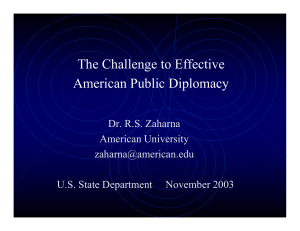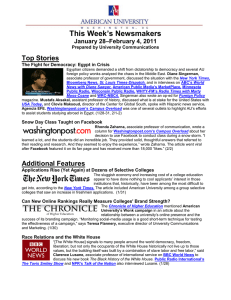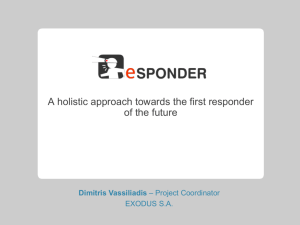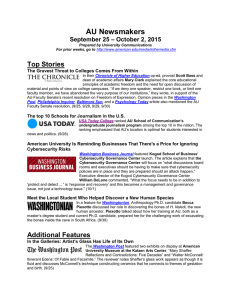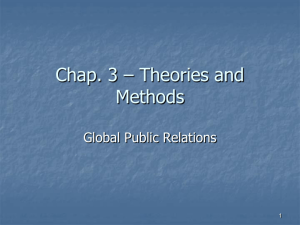Navigating the Cultural Terrain: Portable Cultural Radar System (PCRS) R.S. Zaharna
advertisement
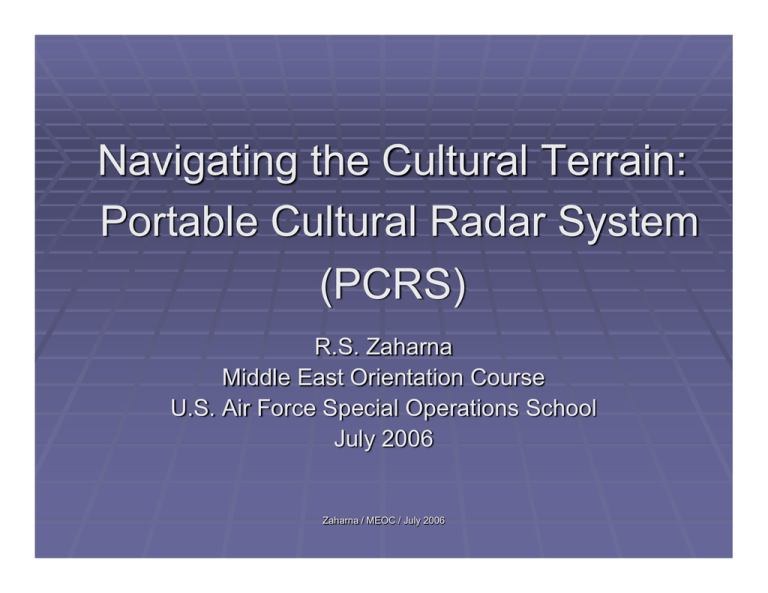
Navigating the Cultural Terrain: Portable Cultural Radar System (PCRS) R.S. Zaharna Middle East Orientation Course U.S. Air Force Special Operations School July 2006 Zaharna / MEOC / July 2006 Why know the cultural terrain? - urban warfare / insurgency - trigger cultural landmines - protective gear How be effective/secure without alienate – CULTURALLY ALERT - culturally alert / cultural radar on / people will give you cues listen observe culture – social – personal Å Æ combat back-up mode (high stress vulnerable) - know where & how to look (can’t know everything) -know areas / social / power / family / communication v nv - know own culture – something’s weird here How to sabotage or blind yourself in a cultural terrain – CULTURAL BLINDERS - alert Ædifferent vs judging Æright/wrong [blinded by the differences] American-centrocism [using American culture as a standard to measure or evaluate other culture. - mirror phenomenon [what you see is what you get / how you feel, he feels] - good intentions Æ we’re all human [blinded by similarities] - cultural projection [what you believe is what you see/ if I like it, he’ll like it] Culturally Alert – Assess the cultural terrain – potential differences social / power / family / values / respect, honor, dignity / gender / age Communication - verbal / nonverbal Zaharna / MEOC / July 2006 Overview Urban warfare Æ Know the cultural terrain Effective/secure = Culturally Alert Vulnerable = Culture Jamming Portable Cultural Radar System (PCRS) Zaharna / MEOC / July 2006 Urban Warfare – Insurgency Knowledge of physical terrain Weapons system & equipment Tactical knowledge Civilian population Æ cultural terrain Zaharna / MEOC / July 2006 Urban Warfare – Cultural Dynamic Local Population US troops Zaharna / MEOC / July 2006 Insurgency Footnotes – Iraqi Insurgency Insurgency not swarming and dispersing out of thin air – but from within the local population. Insurgency – tactical advantage of knowing how to navigate the cultural terrain Zaharna / MEOC / July 2006 Why important to know how to navigate cultural terrain? Urban warfare Æ need neutral/positive support of local population. Local population Physical terrain – visible Cultural terrain – invisible Zaharna / MEOC / July 2006 Cultural terrain filled with CCBMs Cross-Cultural Ballistic Missile (CCBM) = cultural differences that carry emotional significance Launch or hit by CCBM: tension, confusion, misunderstanding turn public against US personnel and mission push to protect or support the other side Zaharna / MEOC / July 2006 Navigate the Cultural Terrain If know how to navigate the cultural terrain Æ Avoid triggering CCBM Æ Increase mission effectiveness Æ Provide security buffer (protective gear, early warning) Æ Undercut insurgency tactical advantage Zaharna / MEOC / July 2006 Strategic Choice? 1) KNOW the cultural terrain? (knowledge) 2) NAVIGATE the cultural terrain? (skill) Zaharna / MEOC / July 2006 KNOW the cultural terrain? 1 – Not possible to know everything 2 – Too many side factors (social, tribal, age, gender, personal, bad day) 3 –Combat setting (high-stress, “back-up mode”) Zaharna / MEOC / July 2006 Navigate the Cultural Terrain 1 – Culturally alert (keep your edge) 2 – Look & Listen (people will give you cues, signals) 3 – Know where & how to look & listen (cultural differences – important signals) PCRS Æ Portable Cultural Radar System Zaharna / MEOC / July 2006 Portable Cultural Radar System Signal Processing Zaharna / MEOC / July 2006 Being Alert to Cultural Signals Whenever operating in cultural terrain – NEED to activate your Cultural Radar Screen Be alert to cultural signals that people are sending that carry important information on how to navigate the cultural terrain. Knowing where & how to Look & Listen Zaharna / MEOC / July 2006 PCRS Relationship Eye contact Greeting Personal distance Signal Processing Zaharna / MEOC / July 2006 Cultural Radar Jamming Flat Surface: JudgeÆ right or wrong Spot Jamming: American-centrocism Decoy: Stereotyping (false targets) Interference: We’re all human (clutter) Zaharna / MEOC / July 2006 Tuning into Different Cultural Frequencies US Military Doing oriented Iraqi Civilians Social oriented “Get the job done” Task focused Expediency Security Public face: Dignity, honor, respect Relations: family, tribe, home Zaharna / MEOC / July 2006 Cultural Signals 1. Social Target Areas Relationships Reciprocity Respect 2. Nonverbal Target Areas (eye contact, distance, time) 3. Verbal Target Areas: greetings, expressions, voice tone Zaharna / MEOC / July 2006 Social Target Areas Relationships Reciprocity Respect Signal Processing Zaharna / MEOC / July 2006 Signal Processing: Relationships Relationships (social status, power, family connection, familiarity) Who is connected to whom? What is their connection? How strong? Positive or negative? Power over or subordinate? Public or private power? Zaharna / MEOC / July 2006 Signal Processing: Reciprocity Reciprocity – helps establish and maintain relationship – need keep scales balanced What exchanged? Greetings Gifts Platitudes / compliments Opening door and entering / exiting Zaharna / MEOC / July 2006 Signal Processing: Respect Respect – honor, dignity, public face How greet acquaintance? Stranger? How talk to village leader – voice tone? How ask supervisor – eye contact? How question man with wife and children – public face? How search female – personal space? Zaharna / MEOC / July 2006 Nonverbal Target Areas Eye contact Distance Time Signal Processing Zaharna / MEOC / July 2006 Nonverbal Target Areas LOOK for relationship, power, respect, familiarity, vulnerability 1. Eye contact 2. Personal distance 3. Time use Zaharna / MEOC / July 2006 Signal Processing: Eye Contact Eye Contact – different cultural rules - How long appropriate? American? Iraqi? - Stare American culture = - Male respect for elderly male? - Male respect for female? - Bargaining / Enter store – look at Owner? Items? - Bargaining/Negotiating – Owner? Item? Zaharna / MEOC / July 2006 Signal Processing: Personal Distance Personal distance / space – amount of personal space or distance from other How close is too close? What personal distance for same sex? Youth? Elderly? Elderly village head? Supervisor? Marketplace stranger? Searching? Questioning? Zaharna / MEOC / July 2006 Signal Processing: Time How use time – different cultural perspectives – listen to the social clock How do you know WHEN … to start work? End work? Eat lunch? Ask question? What activities conducted around … Dawn prayer? Noon prayer? Afternoon prayer? Sunset prayer? Evening prayer? Zaharna / MEOC / July 2006 Signal Processing: Time Signal interference: “It’s frustrating… We say be ready at 0900, and they say inshallah [God willing]. We show up ready to work, and they say, 'Have some tea.’ Zaharna / MEOC / July 2006 Verbal Target Areas Greetings Expressions Voice tone Signal Processing Zaharna / MEOC / July 2006 Verbal Target Areas LISTEN for relationship, power, respect, familiarity, vulnerability 1. Greetings 2. Expressions 3. Tone of voice Zaharna / MEOC / July 2006 Verbal Signal Processing - Greetings Greetings – offer, acknowledge, reciprocate Who greets whom? - If you enter a room? - If you are in a room and someone enters? - If you pass a person on the street? - If you suspect the person, not sure? - If person is male? female? Zaharna / MEOC / July 2006 Signal Processing - Expressions Expressions – cues tell what is important When, why say … God willing [in shah Allah] Thanks be to God [il-hamdu l-Allah] Peace be upon you [As-salamu alia-kum] God be with you [Allah ma’akk] If you please [it-ta-fad-dal] Zaharna / MEOC / July 2006 Signal Processing - Voice Tone Voice tone – listen for relationship, power, respect, vulnerability, familiarity, hostility What is voice tone for … Greeting elderly family head? Greeting young male family head? Asking supervisor for something? Answering supervisor? Greetings between females? Males? Zaharna / MEOC / July 2006 PCRS – Alert to Cultural Signals What’s different? Culturally Alert (skill pick up signals) What’s familiar? How is it different? Zaharna / MEOC / July 2006 Knowledge (signal processing) How Use Knowledge Portable Cultural Radar System Social signals Verbal signals Nonverbal signals Signal Processing Zaharna / MEOC / July 2006 Thank you. RS Zaharna School of Communication American University Washington, DC 20016-8017 (202) 885-3995 zaharna@american.edu http://academic3.american.edu/~zaharna Zaharna / MEOC / July 2006 END PART I Zaharna / MEOC / July 2006 BEGIN PART II EXERCISES Zaharna / MEOC / July 2006 Person Cultural Radar System (PCRS) Exercises for Target Areas Zaharna – Part II MEOC – July 2006 Zaharna / MEOC / July 2006 Portable Cultural Radar System Social signals Verbal signals Nonverbal signals Signal Processing Zaharna / MEOC / July 2006 PCRS – Alert to Cultural Signals What’s different? Culturally Alert (skill pick up signals) What’s familiar? How is it different? Zaharna / MEOC / July 2006 Knowledge (signal processing) How Use Knowledge Social Target Areas Relationships Reciprocity Respect Signal Processing Zaharna / MEOC / July 2006 Signal Processing: Relationships Relationships (social status, power, family connection, familiarity) Who is connected to whom? What is their connection? How strong? Positive or negative? Power over or subordinate? Public or private power? Zaharna / MEOC / July 2006 Skill - Signal Processing: Reciprocity Reciprocity – helps establish and maintain relationship – need keep scales balanced Gifts: 1. What given, what returned? 2. By whom, to whom? 3. Symbolism? Value? 4. Special Occasion? 5. Given at start or end of visit? Zaharna / MEOC / July 2006 Signal Processing: Respect Respect – honor, dignity, public face 1. 2. 3. 4. 5. Offering Greetings Talking to village leader Questioning man with wife and children Search female Unclean: shoes, dogs Zaharna / MEOC / July 2006 Nonverbal Target Areas Eye contact Distance Time Signal Processing Zaharna / MEOC / July 2006 Signal Processing: Eye Contact Eye Contact – different cultural rules - How long appropriate? American? Iraqi? - Stare American culture = - Male respect for elderly male? - Male respect for female? - Bargaining / Enter store – look at Owner? Items? - Bargaining/Negotiating – Owner? Item? Zaharna / MEOC / July 2006 Signal Processing: Personal Distance Personal distance / space – amount of personal space or distance from other How close is too close? What personal distance for same sex? Youth? Elderly? Elderly village head? Supervisor? Marketplace stranger? Searching? Questioning? Zaharna / MEOC / July 2006 Personal space/ Posture Zaharna / MEOC / July 2006 Time Perspectives Future – oriented Value new, change, Past – oriented Value history, progress, potential Frustrated with historical details Ease in strategizing and forecasting “Been there, done that!” tradition, lineage Frustrated with detailed planning Ease in making historical links “We’ve always done it this way!” Zaharna / MEOC / July 2006 Signal Processing: Time “It’s frustrating… We say be ready at 0900, and they say inshallah [God willing]. We show up ready to work, and they say, 'Have some tea.’ Zaharna / MEOC / July 2006 What’s Familiar? Time “Meetings in the American military are straightforward, down to business, the clear communication of ideas in the shortest time. It's not that way in the Iraqi Army.” Zaharna / MEOC / July 2006 Signal Processing: Time Learning to listen to the social clock What activities conducted around … Dawn prayer? [0400] Noon prayer? [1300] Afternoon prayer? [1600] Sunset prayer? [2000] Evening prayer? [2200] Zaharna / MEOC / July 2006 Verbal Target Areas Greetings Expressions Voice tone Signal Processing Zaharna / MEOC / July 2006 Verbal Target Areas LISTEN for relationship, power, respect, familiarity, vulnerability 1. Greetings 2. Expressions 3. Tone of voice Zaharna / MEOC / July 2006 Verbal Signal Processing - Greetings Greetings – offer, acknowledge, reciprocate Who greets whom? - If you enter a room? - If you are in a room and someone enters? - If you pass a person on the street? - If you suspect the person, not sure? - If person is male? female? Zaharna / MEOC / July 2006 Signal Processing - Expressions Expressions – cues tell what is important When, why say … God willing [in shah Allah] Thanks be to God [il-hamdu l-Allah] Peace be upon you [As-salamu alia-kum] God be with you [Allah ma’aak] If you please [it-ta-fad-dal] Zaharna / MEOC / July 2006 Signal Processing - Voice Tone Voice tone – listen for relationship, power, respect, vulnerability, familiarity, hostility What is voice tone for … Greeting elderly family head? Greeting young male family head? Asking supervisor for something? Answering supervisor? Greetings between females? Males? Zaharna / MEOC / July 2006 Thank you. RS Zaharna School of Communication American University Washington, DC 20016-8017 (202) 885-3995 zaharna@american.edu http://academic3.american.edu/~zaharna Zaharna / MEOC / July 2006 END PART II Zaharna / MEOC / July 2006 BEGIN PART III DIFFERENCES Zaharna / MEOC / July 2006 PCRS: Being Alert to Potential Cultural Differences Part III MEOC – July 2006 Zaharna / MEOC / July 2006 Disparity: Cultural Values US Military Doing oriented Iraqi Civilians Social oriented “Get the job done” Task focused Expediency Security Public face: Dignity, honor, respect Relations: family, tribe, home Zaharna / MEOC / July 2006 American Cultural Assumptions about Communication Communication = Information transfer Focus Æ message Problem Æ absent or incorrect information Solution Æ more or better information “If I explain to the person (give information), he’ll do it.” Zaharna / MEOC / July 2006 Arab Cultural Assumptions about Communication Communication = Social process Focus Æ relationships Problem Æ strained or broken relations SolutionÆ fix relations “If relationship bad, why listen to the person or trust what he says?” Zaharna / MEOC / July 2006 Communicating Preferences Written word valued Singular experience Accuracy Tools - facts, evidence argument Analytical reasoning Speaker detached from audience Oral / aural valued Group experience Emotional resonance Tools – analogies, metaphors, images Intuitive reasoning Speaker interacts with audience Zaharna / MEOC / July 2006 Getting Acquainted: American & Arab What’s important? What do you do? Professional status, Where are you from? Social status, achievement Impt - action, results of action What you know Competence Professionalism family Impt - relationships, social connections Who you know Social network Loyalty Zaharna / MEOC / July 2006 Just Talking Meaning in the Meaning in the social message Listen to what I say setting Listen to who said it when, where, to whom, why Message implicit Listeners co-create message Messages explicit Speaker responsible for clear message Zaharna / MEOC / July 2006 Providing Information To the point Linear, direct Seems “clear” Value objectivity Deliberately control emotions What point? Circular, indirect Seems “vague” Value subjectivity Deliberately use emotion Zaharna / MEOC / July 2006 Persuading the Other Direct Facts, evidence, Indirect Metaphors, analogies, argument Future-oriented – “we will” Individual appeal, choice Self-Promotion rhetorical questions Past-oriented Collective/Communal appeals Credit to the Creator Zaharna / MEOC / July 2006 Time Perspectives Future – oriented Value new, change, Past – oriented Value history, progress, potential Frustrated with historical details Ease in strategizing and forecasting “Been there, done that!” tradition, lineage Frustrated with detailed planning Ease in making historical links “We’ve always done it this way!” Zaharna / MEOC / July 2006 Scheduling Differences One at a time Time – linear, Many at a time Time – nonlinear, segmented, beginning and end Value planned schedule fluid, begin or end difficult Value spontaneity Zaharna / MEOC / July 2006 Individual or Group Focus Individual goals, Group goals, norms, freedom, choice Impt - Personal achievement Networking with strangers (out-group) sensibilities Impt - Group solidarity Strong distinction between IN-group and OUT-group Zaharna / MEOC / July 2006 Views of Relationships Relationship: useful Relationship: trust, short-term Relationship problemcut it Relationship goal: produce results long-term Relationship problemfix it, find mediator Relationship goal: build social capital Zaharna / MEOC / July 2006 Power Differences Equality - Hierarchy - We’re all equals Individual responsibility Power = individual control over another well-defined structure social status Social responsibility Power = duty and responsibility to group Zaharna / MEOC / July 2006 Thank you. RS Zaharna School of Communication American University Washington, DC 20016-8017 (202) 885-3995 zaharna@american.edu http://academic3.american.edu/~zaharna Zaharna / MEOC / July 2006 END PART III DIFFERENCES Zaharna / MEOC / July 2006
